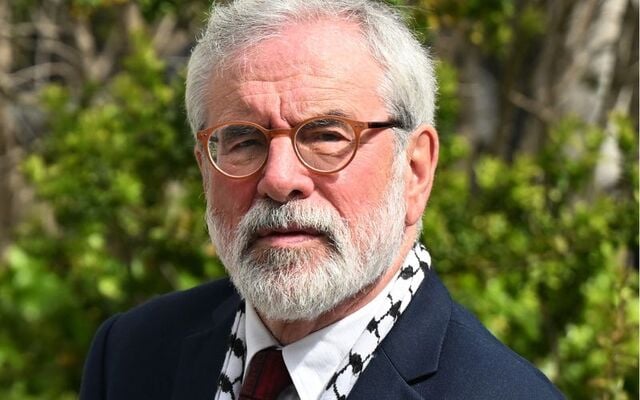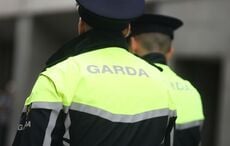Gerry Adams, the former President of Sinn Féin, won his libel case against the British Broadcasting Corporation (BBC) in Dublin's High Court today, Friday, May 30.
Adams, 76, sought damages after a BBC "Spotlight" programme, citing an anonymous source, claimed Adams ordered the March 2006 killing of Denis Donaldson, a former senior member of Sinn Féin who later confessed to being a British spy.
The day after the "Spotlight" programme aired in September 2016, an article with the headline "Gerry Adams sanctioned Denis Donaldson killing" was published on the BBC website.
Adams denies sanctioning the killing of Donaldson; the dissident Republican group the Real IRA later claimed responsibility.
After seven hours of deliberations, the Dublin jury of 11 people decided in Adams' favor, awarding him €100,000 in damages.
"Putting manners on the British Broadcasting Corporation"
Speaking after the court's decision on Friday, Adams told reporters: "I'm very mindful of the Donaldson family in the court at this long trial and indeed of the victims' families who have had to watch all of this.
"I want to say that the Justice Minister, Jim O'Callaghan, should meet the family of Denis Donaldson as quickly as possible.
"There is an onus on both governments and everyone else - and I include myself in this - to try and deal with these legacy issues as best as we can."
Adams continued: "From my perspective, taking this case was about putting manners on the British Broadcasting Corporation.
"I know many, many journalists; I like to think that I get on well with the most of them. And I wish you well, and I would uphold your right to do your job.
"But the British Broadcasting Corporation upholds the ethos of the British State in Ireland.
"And in my view, it's out of sync in many, many fronts with the Good Friday Agreement. It hasn't caught on to where we are on this island as part of the process, the continuing process of building peace and justice and harmony and hopefully in the time ahead, unity."
"Direct political interference"
He continued: "I'm very mindful that this case could have been settled.
"The licence payers are going to pay for this. The BBC aren't using their own money, 'Spotlight' aren't using their own money, it's the licence payers and as [Adams' solicitor] Paul Tweed has said, this could have been sorted out a long time ago.
"But I'm mindful of an unrelated case, again which I won and which the Supreme Court in London decided that I, and up to three or four hundred internees, had been unlawfully detained. And the British Prime Minister is refusing to pay - I don't mind - but is refusing to pay compensation to what are now quite elderly former internees. He has actually said that he will use every conceivable mechanism to prevent compensation being paid.
"So, if you want an explanation why this went on for nine years, and why we spent five weeks here, I think there is direct political interference with this."
BREAKING: Gerry Adams has spoken after winning his defamation case against the BBC. The former Sinn Féin leader was awarded €100,000 in damages over allegations made in a 2016 programme.
More on #VMNews pic.twitter.com/idOTNcfoRG
— Virgin Media News (@VirginMediaNews) May 30, 2025
"Profound" implications
In a statement on behalf of the BBC, Adam Smyth, Director of BBC Northern Ireland, said: "We are disappointed by this verdict.
"We believe we supplied extensive evidence to the court of the careful editorial process and journalistic diligence applied to this programme and accompanying online article.
"Moreover, it was accepted by the court, and conceded by Gerry Adams’ legal team, that the Spotlight broadcast and publication were of the highest public interest.
"We didn’t want to come to court, but it was important that we defend our journalism and we stand by that decision.
"Our past is difficult terrain for any jury and we thank them for their diligence and careful consideration of the issues in this case.
"The implications of their decision, though, are profound. As our legal team made clear, if the BBC’s case cannot be won under existing Irish defamation law, it’s hard to see how anyone’s could. And they warned that today’s decision could hinder freedom of expression.
"Of course, a case of this importance, duration and complexity involves significant expense. In common with other media organisations, the BBC has insurance and makes financial provision for ongoing and anticipated legal claims.
"We would like to thank Jennifer O’Leary, Gwyneth Jones, and all those who gave evidence on behalf of the BBC, as well as our legal team for their unwavering support.
"We will now take some time with them to consider the implications of this ruling."
"Nothing to hide"
After thanking her legal teams, Jennifer O’Leary, Spotlight reporter, said: "I said in the witness box that I had nothing to hide, only sources to protect, and I want to thank them for trusting me.
"I also want to acknowledge and thank our witnesses in court – Trevor Ringland, Senator Michael McDowell, and Ann Travers – who spoke so courageously. And there are thousands of Ann Travers across this island and in Britain - victims and survivors of the Troubles AND the years after the peace agreement who carry the burden of their grief and trauma with incredible courage. They are the people I’m thinking of – all of them. Thank you."




Comments